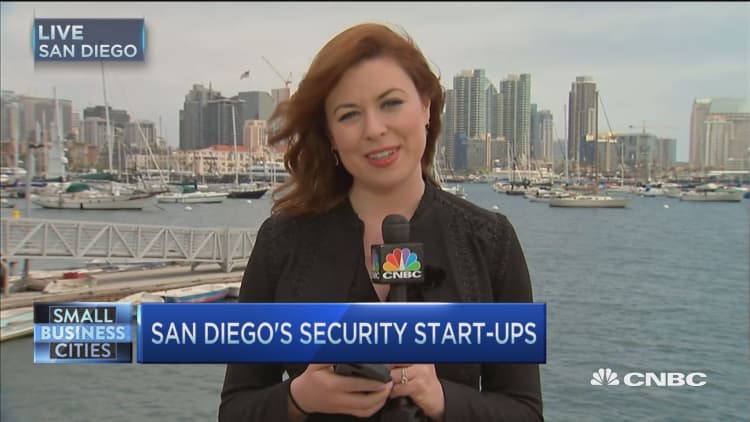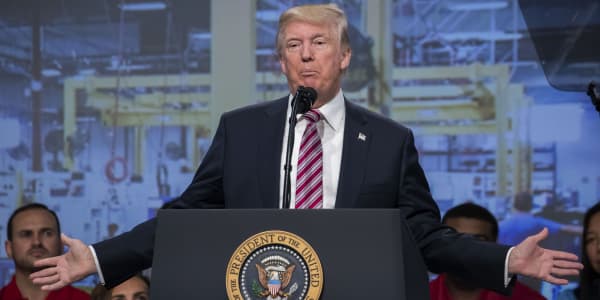


The devices we rely on each day are constantly improving, with new versions of phones, tablets and wearbles, but their battery life never quite seems to get a boost. It's something 25-year-old Hahna Alexander is tackling from a scrappy office building in Pittsburgh.
Alexander is co-founder and CEO of SolePower, a start-up that makes power-generating shoe insoles, called EnSoles, that charge portable electronics, such as smartphones and GPS, by harvesting the energy taken with each step and storing it in an easily accessible battery. The company claims that for every one hour of walking — about 6,750 steps — enough power is generated for 30 minutes of talk time on a smartphone.
SolePower charges $200 a pair for its Ensoles, which are available for preorder online right now. The company will start shipping product this winter.
SolePower was born out of a project at Carnegie Mellon University in 2012, Alexander's senior year as a mechanical engineer. They've raised nearly $1 million so far from investors, including $100,000 from Steve Case's "Rise of the Rest" pitch competition in 2014 and $60,000 on Kickstarter. She demoed her product at the White House, and the U.S. Army is currently testing the product for potential applications. It's safe to say she's onto something.
While moving to the tech hubs in Silicon Alley or Silicon Valley are both tempting, Alexander said Pittsburgh is the place to be for her venture.
"For now, it makes sense to stay in the community with the network that we've built," she said. "There's a low cost of living; we are a few hours from our manufacturers. Access to power is a universal problem, so it makes sense to be central to these different resources."
Start-ups like SolePower are launching and staying in the city, which has reinvented itself — from steel town to tech town — after a post-industrial collapse.
Data from the Kauffman Foundation show Pittsburgh ranks as a top 10 metro for Main Street business activity, with 1,166 established small businesses for every 100,000 residents. The city also boasts a presence from big tech names, including Apple, Google and Uber, drawing on and enhancing its technology workforce.
It's the research and applied talent in A.I., robotics and cyber, which has accelerated [Pittsburgh's] known capabilities.Audrey RussoPresident and CEO, Pittsburgh Technology Council
Locals note that two sets of people are moving into town to help bolster start-up growth — younger residents and the highly educated, and sometimes a blend of both.
"The rise of the food and craft beer scene, paired with CMU's attraction of global businesses having a presence in the city," are part of what is driving traction in the region now, according to Audrey Russo, president and CEO of the Pittsburgh Technology Council, which provides visibility and resources to the local technology ecosystem.
"We have Apple, Uber, Autodesk and Oculus putting deeper tentacles here," said Russo. "It's the research and applied talent in A.I., robotics and cyber, which has accelerated [Pittsburgh's] known capabilities."
Venture capital dollars are also pouring into the region. In the two years of 2014 and 2015, nearly $500 million was raised by 84 businesses in the Pittsburgh MSA, according to the PTC, up from $343 million in the years 2012 and 2013. This puts Pittsburgh behind only Chicago and the Twin Cities in terms of Midwestern venture capital investing during the past two years.
The highest growth sectors are business and financial services, including construction and engineering, and health care, including medical devices and information technology.
A growing ecosystem
Resources are rich for start-ups in the region. There are close to a dozen co-working spaces, incubator and accelerator programs in the area, including those at Carnegie Mellon University and the University of Pittsburgh, according to the Pittsburgh Technology Council.
Local nonprofit Innovation Works has an investment vehicle as well as two accelerators under its umbrella. Since launching its seed fund in 1999, Innovation Works has gone on to invest $65 million in more than 300 local companies. What's more, those start-ups, including SolePower, have gone on to raise another $1.7 billion in follow-on funding.
One of these is RE2, a company that makes robotic arms and ships them out to customers, like the U.S. Department of Defense, in order to keep humans out of harm's way. They've raised $2.25 million in funding, and their products are being used primarily by the U.S. Army and U.S. Navy for bomb disposal.
"These arms are put on robots to do the dull, the dirty and the dangerous," said president and CEO Jorgen Pedersen, a Carnegie Mellon graduate. "I know those arms are being used to save someone's life — what drives us is making an impact on the world."
Another company out to change the world is Thread, launched by Pittsburgh native and CEO Ian Rosenberger after the Haiti earthquake in 2010. The company sources plastic from the poorest neighborhoods in Haiti and Honduras and turns it into fabric. They've raised around $2.8 million in funding and have a deal with Timberland, their biggest account so far. They've taken more than 1 million pounds of trash and turned it into raw materials
"Fashion is the second dirtiest industry in the world, so we started at the bottom of the supply chain and worked our way up." Rosenberger said.
"I love the parallels with Pittsburgh, being a rebuilding city, and the places that we really care about, like Port au Prince and Honduras. With us, there is a turnaround story."





